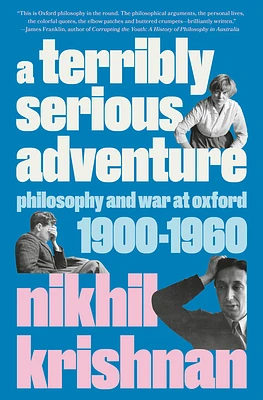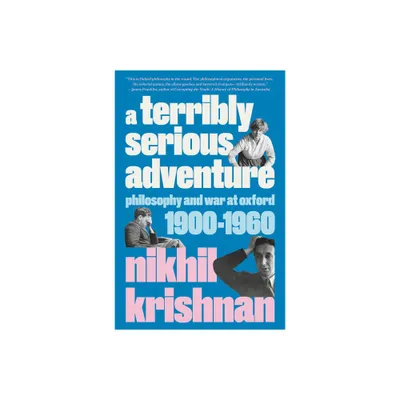Home
A Terribly Serious Adventure: Philosophy and War at Oxford, 1900-1960
Loading Inventory...
Barnes and Noble
A Terribly Serious Adventure: Philosophy and War at Oxford, 1900-1960
Current price: $22.50


Barnes and Noble
A Terribly Serious Adventure: Philosophy and War at Oxford, 1900-1960
Current price: $22.50
Loading Inventory...
Size: Audiobook
*Product Information may vary - to confirm product availability, pricing, and additional information please contact Barnes and Noble
“Teeming with Oxford characters [and] lively storytelling . . . [recasts] the history of philosophy at Oxford in the mid-twentieth century by conveying not only what made it influential in its time but also what might make it vital in ours.”—
The New York Times Book Review
(Editors’ Choice)
“Ordinary Language can hardly convey how much I loved this book.”—Tom Stoppard,
Times Literary Supplement
(“Books of the Year 2023”)
A
NEW YORK TIMES
BEST BOOK OF THE YEAR
What are the limits of language? How can philosophy be brought closer to everyday life? What is a good human being?
These were among the questions that philosophers wrestled with in mid-twentieth-century Britain, a period shadowed by war and the rise of fascism. In response to these events, thinkers such as Philippa Foot (originator of the famous trolley problem), Isaiah Berlin, Iris Murdoch, Elizabeth Anscombe, Gilbert Ryle, and J. L. Austin aspired to a new level of watchfulness and self-awareness about language as a way of keeping philosophy true to everyday experience.
A Terribly Serious Adventure
traces the friendships and the rivalries, the shared preoccupations and the passionate disagreements of some of Oxford’s most innovative thinkers. Far from being stuck in their ivory towers, the Oxford philosophers lived. They were codebreakers, diplomats, and soldiers in both World Wars, and they often drew on their real-world experience in creating their greatest works, masterpieces of British modernism original in both thought and style.
Steeped in the dramatic history of the twentieth century,
is an eye-opening look inside the rooms that changed how we think about our world. Shedding light on the lives and intellectual achievements of a large and spirited cast of characters, Cambridge academic Nikhil Krishnan shows us how much we can still learn from the Oxford philosophers. In our fractious, post-truth world, their acute sense of responsibility for their words, their passionate desire to get the little things right, stands as an inspiring example.
The New York Times Book Review
(Editors’ Choice)
“Ordinary Language can hardly convey how much I loved this book.”—Tom Stoppard,
Times Literary Supplement
(“Books of the Year 2023”)
A
NEW YORK TIMES
BEST BOOK OF THE YEAR
What are the limits of language? How can philosophy be brought closer to everyday life? What is a good human being?
These were among the questions that philosophers wrestled with in mid-twentieth-century Britain, a period shadowed by war and the rise of fascism. In response to these events, thinkers such as Philippa Foot (originator of the famous trolley problem), Isaiah Berlin, Iris Murdoch, Elizabeth Anscombe, Gilbert Ryle, and J. L. Austin aspired to a new level of watchfulness and self-awareness about language as a way of keeping philosophy true to everyday experience.
A Terribly Serious Adventure
traces the friendships and the rivalries, the shared preoccupations and the passionate disagreements of some of Oxford’s most innovative thinkers. Far from being stuck in their ivory towers, the Oxford philosophers lived. They were codebreakers, diplomats, and soldiers in both World Wars, and they often drew on their real-world experience in creating their greatest works, masterpieces of British modernism original in both thought and style.
Steeped in the dramatic history of the twentieth century,
is an eye-opening look inside the rooms that changed how we think about our world. Shedding light on the lives and intellectual achievements of a large and spirited cast of characters, Cambridge academic Nikhil Krishnan shows us how much we can still learn from the Oxford philosophers. In our fractious, post-truth world, their acute sense of responsibility for their words, their passionate desire to get the little things right, stands as an inspiring example.


















